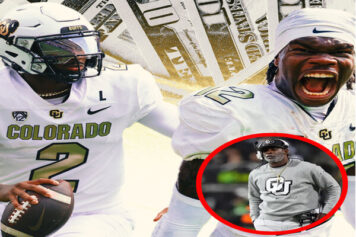On Friday, news trickled out that A-List Hollywood director Ridley Scott was searching for an A-List writer to pen a script focusing on the NFL’s current concussion problem. Here's the basic rundown on what little information Deadline reportedly knows:
he and producing partner Giannina Facio have been meeting with A-list writers for what he hopes will be the next film he directs. Scott wants to create a drama focusing on the debilitating effects that concussions are having on our sports heroes, and the role that league owners play in allowing it to happen. His plan is to create a morality tale on that issue, much the way that Michael Mann’s The Insider took on the tobacco industry’s complicity in covering up the addictive and cancer-causing effects of cigarette smoking.
It seems like an unusual topic for a director known for tackling original sci-fi ideas and war epics, but it could also bring more awareness to the revelations about concussions that have altered safety protocols from the NFL to Pop Warner fields.
Scott will certainly face opposition from the National Football League and, true to his nature, the director’s cut will be an hour longer than the big screen version. Any Given Sunday is propped up as the opus magnum of motion pictures about professional football, but it was melodramatic and chock full of hyperbole. Remember the eyeball on the field? Though Ron Howard raised the bar on sports films with this fall’s Rush, Ridley Scott could lift it another notch with the most poignant sports film of the millennium. Like the unpleasant images of Xenomorphs bursting through chests in Scott's Alien franchise, his project could be the NFL's new nightmare.
It also could provide an opportunity to revive Cuba Gooding Jr.’s career by updating us on Rod Tidwell's condition in the aftermath of one of the most iconic scenes from 1996's Jerry Maguire.
Prior to the focus on concussions, the public’s only previous concerns for the brains of athletes involved the Wonderlic and the one in Ted Williams’ cryogenically frozen head. Since Jack Tatum’s vicious hit paralyzed Darryl Stingley after a vicious hit in 1978, avoiding spinal cord injuries has been the NFL’s priority. Tidwell’s memorable touchdown scene towards the conclusion of Jerry Maguire would probably play out differently on the silver screen today.
After hauling in a touchdown pass and inadvertently slamming right into the goalpost at full speed, Tidwell layed motionless on his back as coaches and trainers surrounded him. Their worst fears were assuaged when he was seen moving his extremities.
Once Tidwell bounced onto his feet and became the poster child for a decade of excessive end zone celebrations, all was forgotten. However, in a modern film script, the real danger would be lurking within the deepest recesses of his brain biology. Scott's story would begin where Tidwell's ended.
When Tidwell initially opens his eyes after a brief visit to lala land, he had the look of a man who was having visions of Tweety Birds circling his head. Tidwell’s backflip and excessively elaborate end zone celebration may have been the symptoms of a concussion. It’s not uncommon. There have been numerous reports of athletes suffering concussions and briefly assuming alternate identities while blacked out.
LSU fumbling fullback J.C. Copeland slipped in the locker room shower a few weeks ago and reportedly referred to himself as Luscious Brown during a period of time which he admitted to having blacked out. Tidwell channeled Paula Abdul. Today, the concern is the scientific evidence which reveals that the accumulation of those types of hits negatively alters the brain chemistry of professional football players permanently.
If there was a Jerry Maguire sequel, it would probably address the mood swings and Tidwell’s bouts with memory loss and a degenerative brain condition that his non-fictional peers like Tony Dorsett, Joe DeLamielleure and Mark Duper admitted to suffering from over the past week alone.
In 2000, the United States’ top neuroscientists allegedly informed the NFL that the violent collisions players suffered on a weekly basis led to something known as chronic traumatic encephalopathy, otherwise known as CTE. For years, the league kept those findings under wraps.
CTE remains a bit of mystery, but it’s now an incontrovertible fact that cognitive impairments among former NFL players were the reverberations of repetitive trauma to the brain during the course of their professional football careers.
Parents of little league football players and casual fans won’t necessarily read reports or watch PBS documentaries. However, a major motion picture on the subject could shift the tide of the casual public’s opinion about the NFL from apathy to antipathy.
Like the Catholic Church, the NFL is tax exempt, usually finds its colossal cathedrals overflowing with devout fans on Sundays and has been implicated in cover-ups of the most ignominious of controversies that rocked the very core of their organizations. For years, the NFL was implicit in a cover-up of data that would essentially prove that concussions were hazardous to the long-term health of football players. All football players volunteer for the physical demands and injuries that come along with playing the sport, but by covering up the truth, the NFL robbed its athletes of the knowledge that would have allowed them to assess the risks they were taking.
The NFL’s $765 million settlement with retired players resolved them of responsibility in a legal context, but not morally. Scott has a chance to land a blow to the NFL’s reputation.
However, a dramatization of the long-term effects a pro career can have on its stars in retirement, while juxtaposed against the NFL’s cover-up, could cause more parents to keep their sons away from football fields.
Films cam be a powerful vehicle for addressing real world issues to mass consumers. Pop Warner participation has alread declined 10 percent between 2010 and 2012. This could further shifted public opinion against the NFL.
1993’s Philadelphia, which was inspired by the real-life story of Geoffrey Bowers’ discrimination suit against his firm Baker & McKenzie, starred Tom Hanks and Denzel Washington. Although AIDS/HIV was a virus that emerged in the black community during the early 80s, Philadelphia was the first film to confront the AIDS virus head on. It exposed an everyday audience to the realities of life with the disease.
As I said before, nobody is really sure why Scott is drifting into sports film territory, but I have a theory. This isn’t necessarily a sports film. As Grantland’s Sean Fennessey and Chris Ryan discussed two weeks ago, Ridley Scott’s films often contain subliminal messages.
Beneath the surface, this one may not have been inspired less by Tony Dorsett, but by Tony Scott, Ridley’s brother. One year ago, the Top Gun director committed suicide by jumping off the Vincent Thomas Bridge on Long Beach and initial reports afterwards alleged he was diagnosed with brain cancer. Ultimately, those proved false, but anti-depressants were found in his system.
The general public only became aware of CTE’s existence after the impetus of high-profile suicides of prominent retired players Mike Webster, Terry Long and Junior Seau who shot himself in the chest so that his brain could be studied. All three were diagnosed with CTE posthumously because it cannot be confirmed in the brain of the living.
With his clout, Scott could snag a few A-List stars and produce a smart, witty and intrepid look at the NFL’s seedy underbelly while raising social awareness about concussions and football. If done right, Scott’s film has the potential to be the NFL’s Philadelphia.



